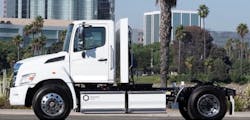Hexagon Purus assembling Hino Trucks with Battery Electric systems in U.S.
E-mobility technology manufacturer Hexagon Purus has entered into an exclusive distribution agreement with Hino Trucks for its battery electric equipment to be built onto Hino’s heavy-duty truck chassis in the U.S.
Hexagon Purus is a Norwegian manufacturer of hydrogen-based batteries and distribution systems for electric vehicles, while Hino Trucks is an automobile manufacturer headquartered in Novi, Michigan and a subsidiary of Toyota Group.
Under the deal, the Hexagon-assembled trucks will be distributed exclusively through select qualifying dealers in Hino’s network. Serial production of these electric heavy-duty trucks is expected to commence at the end of 2024. Hino will also be responsible for after-sales service during the lifetime of the agreement.
The trucks will be based on Hino’s XL 4x2 truck chassis and equipped with Hexagon’s proprietary zero-emission technology, including auxiliary modules, battery systems, vehicle-level software and power modules.
The agreement, which was built off of a letter of intent in 2022, anticipates the delivery of up to 10,000 trucks by 2030 and has the potential to reach a total value of approximately $2 billion. The deal expands on the cooperation announced between Hexagon Purus and Hino last year to supply battery packs for multiple Hino truck platforms planned for serial production from 2024.
Hexagon Purus banks on Fuel Cell Future with new H2 Cylinder plant in Maryland
Hexagon Purus to supply Battery Packs for Hino Motors Truck Platforms
The transportation sector must cut emissions by 75 percent until 2050 to reach the 1.5°C ambition set by the Paris agreement in 2015, according to various reports. To address this need, both the Environmental Protection Act (EPA) and California Air Resources Board (CARB) have introduced proposals and regulations in the U.S. that aim to reduce emissions and accelerate the adoption of zero-emission vehicles in the transportation sector.
“Approximately 12 percent of commercial vehicles operating in California fall within the heavy-duty trucks classification, however, they account for almost half of California’s nitrogen-oxide emissions in the medium- and heavy-duty space,” said Todd Sloan, EVP of Hexagon Purus. “Targeting the disproportionate emissions of specifically these trucks through increasing adoption of zero-emission vehicles is crucial to reduce emissions in California and across the whole of the U.S.”
In California, CARB has introduced a regulation for truck manufacturers (Advanced Clean Truck standard), and more recently, proposed a new regulation for fleet owners (Advanced Clean Fleet standard). The ACT regulation, which has already been adopted by five other states in the U.S., requires 5 percent of all new class 7 and 8 trucks sold in 2024 in California to be ZEV and new additions to fleets of class 7 and 8 trucks operating to and from intermodal seaports and railyards to be zero-emission vehicles from 2024.
According to CARB, the combined effect from the ACT and ACF regulations will lead to around 500,000 zero-emission vehicles on the road by 2035 in California, increasing to 1.6 million in 2050.
Hexagon Purus, a subsidiary of Europe’s Hexagon, is not solely focused on electric vehicle technologies as part of its e-mobility offerings. The company recently opened a new manufacturing plant in Maryland which makes hydrogen fuel cylinders for fuel-cell vehicles.
